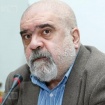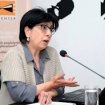Possibilities and Understanding of the Karabakh Conflict Resolution 25 Years after the Ceasefire : Page 6 of 10
organized as a state. Unrecognized of course, but a state. They have leaders, structures, a constitution, control over the territory, eventually an army. Refugee Azerbaijanis who are scattered all over Azerbaijan and the world have none of this. Refugees are a humanitarian problem, Karabakh is a political entity, these are two different things. Otherwise we would have to negotiate with the Baku, Kirovobad, Shamkhor communities and so on. Approximately 1.5 times more Armenians lived in Baku alone than in the NKAO. Is there no need to negotiate with them? Of course, the problems of refugees are and should be taken into account, but this is a problem of a humanitarian nature. And this is not about morality at all, simplyKarabakh will not agree to equalize itself, as a political entity, with a community of people who cannot be even be really take into account. It will not work.
Grazvydas Jasutis – I would not mind seeing NK as a participant in the negotiations process. However, the presence or absence of NK does not affect the dynamic of the negotiations. Suppose, the Nagorno-Karabakhdelegation is present. So what? Azerbaijan would not be delighted with their presence and would completely ignore them, but at the same time, it is not clear how the mediators would react to them. In addition, a strong emphasis on NK’s participation makes it difficult to discuss real issues. This may be tactics in the negotiations, Yerevan insists on Nagorno-Karabakh and can use it as a card for the deal.
"New war - new territories" vs. "Territories in exchange for peace"
Sergey Markedonov - A number of points should be highlighted, regarding the statement made by D. Tonoyan (Editor–the Statement made by the Minister of Defense of the Republic of Armenia, dated March 30, 2019). And the most important thing is the context of inflated expectations. It was necessary to send a political signal indicating to their groundlessness. It is obvious that the head of the Foreign Ministry (of the RA - Editor) cannot convey such a message. The Ministry of Defense, “the hawk” is better suited to this role. We should note that nobody leaves the negotiation process, no one declaressuch intentions. Simply a "red line" is being drawn. Andto this end, theconflict may be“defrosted” by force.
Grazvydas Jasutis - It seems to me that the message of the Minister has three objectives. First, it is aimed at the local community of Armenia and the Diaspora, which wants to get assurances that Armenia is still ready to defend NagornoKarabakh. His second objective was to "inform" Azerbaijan of the unacceptability of offensive operations and that their previous success would not be repeated. The third message was addressed to the international community. It is always better to have a hawkish position at the beginning and soften it later. In other words, he marked some space for maneuvers.
Arif Yunusov –As for the role of blackmail in the negotiation process, in fact, this is normal. Of course, the ideal option is when the parties respect each other and solve the problem, based on







 +37410 563363
+37410 563363
 1/3 Buzand Str, 8 Floor, Yerevan, Armenia
1/3 Buzand Str, 8 Floor, Yerevan, Armenia